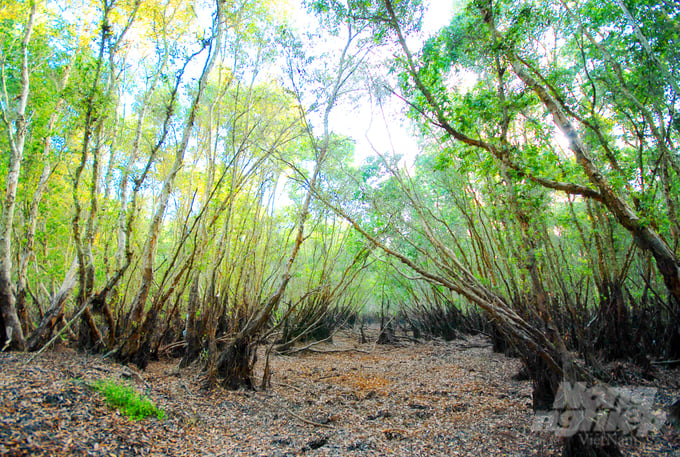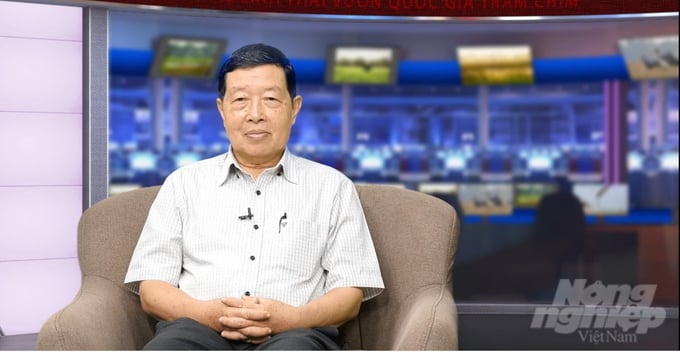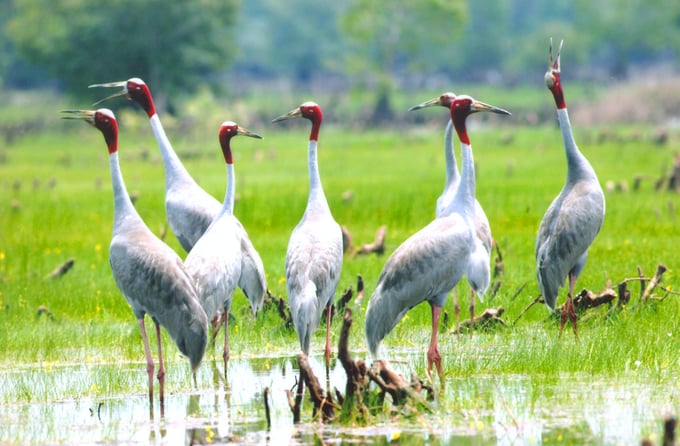May 21, 2025 | 09:58 GMT +7
May 21, 2025 | 09:58 GMT +7
Hotline: 0913.378.918
May 21, 2025 | 09:58 GMT +7
Hotline: 0913.378.918

Recently, the National Park has actively implemented solutions on forest fire prevention and fighting. Photo: Hoang Vu.
In recent times, to restore and develop the ecosystem of Tram Chim National Park, the National Park has actively implemented a series of solutions, especially on fire prevention and fighting.
Sharing with Vietnam Agriculture Newspaper about this work at Tram Chim National Park, Mr. Doan Van Nhanh, Deputy Director of Tram Chim National Park Conservation Center, said that every year, Tram Chim National Park has coordinated with specialized sectors to develop forest fire prevention and fighting plans.
Besides, the Park also creates white fire-resistant runways to prevent fire spread and proactively burns grass. Because it is known that fires rarely start in Melaleuca forests but often burn in grasslands and then spread to Melaleuca forests. Therefore, fire-resistant runways combined with proactive grass burning are one of the very useful measures not only for fire prevention and fighting but also for creating conditions for fast-growing biomes, especially crane feeding grounds.
By May 2023, Tram Chim National Park had begun burning grass to reduce vegetation and plowing to restore habitat for Eleocharis ochrostachys grass. As a result, in January 2024, Eleocharis ochrostachys grass has recovered on about 22 hectares.

Dr. Duong Van Ni, Chairman of the Mekong Conservancy Foundation, Dong Thap Muoi. Photo: VAN.
According to the representative of Tram Chim National Park, in 2024, thanks to proactive grass burning, only 1 day later in the A5 sub-zone, four crane individuals returned, even though they had never returned before. The National Park also recorded many rare and important migratory bird species in the wetland ecosystem, such as painted stork (Mycteria leucocephala), 120 Plegadis falcinellus individuals, 10 Lesser adjutant stork individuals, and thousands of garganey individuals at the same time.
Additionally, the Park has also signed a joint plan between branches in the district to coordinate with each other in patrolling and protecting against illegal intruders and during the dry season to limit people entering and causing forest fires during the dry season.
In addition to forest fire prevention and fighting measures, Tram Chim National Park has also implemented water regulation. According to Dr. Duong Van Ni, Chairman of the Mekong Conservancy Foundation, Dong Thap Muoi currently has too many canals, so those canals bring water straight from the river to Tram Chim, right from the beginning of the rainy season. Thus, the water here is full of alluvium.

Bringing the crane flock back to Tram Chim National Park is one of Dong Thap's efforts in restoring and preserving the ecosystem of the National Park. Photo: Hoang Vu.
"To harmonize this changed environment, Tram Chim National Park has calculated to have reasonable times to release water into the Park, not immediately at the beginning of the flood season because it would bring too much alluvium in and kill many ecosystems inside," said Dr. Duong Van Ni.
One of the outstanding efforts of Dong Thap province in restoring and preserving the ecosystem of Tram Chim National Park is the project to bring the crane flock back to Tram Chim National Park. The Chairman of the Mekong Conservancy Foundation said that this is a burning desire of the leaders of Dong Thap province and is a very good start, or rather, a pioneering spearhead in conservation work in the Mekong Delta.
According to the Deputy Director of Tram Chim National Park Conservation Center, Mr. Doan Van Nhanh, this project has five contents. The first content is to restore the crane flock by nurturing and releasing them into the wild. The second is to restore the internal and external ecosystems. The third is communication work to raise awareness of people around the Park, the buffer zone, as well as inside and outside the province.
The fourth is the agricultural ecosystem towards ecological agriculture and organic agriculture. The fifth is to build infrastructure. The total funding of this project is expected to include about 50% of the provincial budget and 50% of the socialization budget. In particular, the project is not only meaningful in the province but also internationally.
So, to enhance that meaning as well as the conservation of the crane species, Dong Thap province strongly calls on domestic and foreign organizations to join hands to support Dong Thap province in implementing this project.
Besides, preserving and developing ecosystems is an important issue. Due to the difficulties in the management work of the specialized sector, especially with the current climate change situation, there needs to be the cooperation of everyone to contribute to protecting the ecological environment.
Recently, international organizations, typically WWF-Vietnam, have actively implemented activities to restore, preserve, and develop the ecosystem of Tram Chim National Park. Specifically, from August to December 2022, Tram Chim National Park cooperated with WWF-Vietnam to conduct research on the transport and deposition of alluvium and sediment in the Mekong River. In June 2023, the project expanded the agricultural model during the flood season to gradually shift the current 3-crop rice farming models to nature-based farming models aimed at restoring the majority of Dong Thap Muoi's flooded fields in the past. In addition, with funding from the Coca-Cola Foundation through WWF-Vietnam, in early 2023, Tram Chim National Park regulated the water level in the A4 area.
Translated by Thu Huyen

(VAN) Facing the threat of rabies spreading to the community, Gia Lai province urgently carries out measures to vaccinate dogs and cats on a large scale.

(VAN) Disease-free livestock farming not only protects livestock herds but also stabilizes production and livelihoods for many farmers in Tuyen Quang.

(VAN) Japan's grant aid project contributes to capacity building, promoting organic agricultural production, and fostering sustainable community development in Dong Thap province.

(VAN) For years, the CRISPR-Cas9 genome technology has been reshaping genetic engineering, a precision tool to transform everything from agriculture to medicine.

(VAN) Vietnam aims to become a 'leader' in the region in the capacity and managing effectively soil health and crop nutrition.
![Reducing emissions from rice fields: [Part 1] Farming clean rice together](https://t.ex-cdn.com/nongnghiepmoitruong.vn/608w/files/news/2025/05/05/z6509661417740_a647202949c539012a959e841c03e1d3-nongnghiep-143611.jpg)
(VAN) Growing clean rice helps reduce environmental pollution while increasing income, allowing farmers to feel secure in production and remain committed to their fields for the long term.
/2025/05/19/5136-1-144800_230.jpg)
(VAN) The Nghe An Provincial People's Committee has just approved the list of beneficiaries eligible for revenue from the Emission Reductions Payment Agreement (ERPA) in the North Central region for the year 2025.